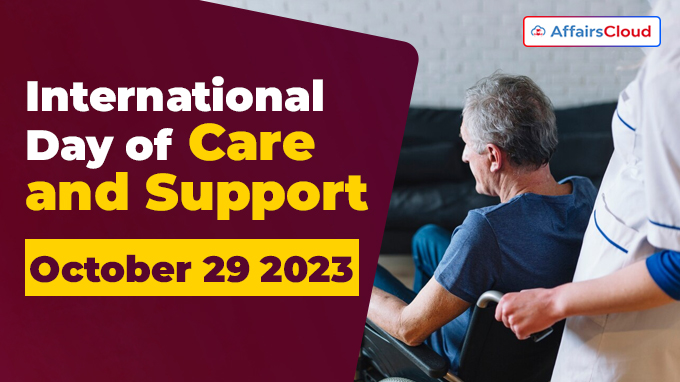 The United Nations (UN)’s first-ever International Day of Care and Support was observed across the globe on 29 October 2023 to emphasise the importance of caregiving, recognize the contributions of caregivers, and advocate for policies and initiatives that support and enhance care in all its forms.
The United Nations (UN)’s first-ever International Day of Care and Support was observed across the globe on 29 October 2023 to emphasise the importance of caregiving, recognize the contributions of caregivers, and advocate for policies and initiatives that support and enhance care in all its forms.
Background:
i.On 24 July 2023, the United Nations General Assembly (UNGA) adopted a resolution A/RES/77/317 and decided to proclaim the 29 October of every year as the International Day of Care and Support.
ii.29 October 2023 marks the first observance of the International Day of Care and Support.
Significance:
i.The annual global observance aims to recognize the crucial need to invest in the care economy and establish resilient, inclusive support systems that value and redistribute unpaid care and domestic work.
ii.The day also aims to raise awareness of the importance of care and support in fostering gender equality and sustaining societies and economies.
iii.It emphasizes rectifying disparities between paid and unpaid care, promoting fair treatment. It also emphasises the significance of acknowledging and valuing paid care work, underscoring its vital role.
Decent Work and Sustainable Development Goal (SDG):
Goal 8: Promote inclusive and sustainable economic growth, employment, and decent work for all.
Sustainable development cannot be achieved without decent work, and vice versa. Sustainable development and the Decent Work Agenda (DWA) are completely linked, each supporting the other.
2023 Events:
i.The Economic and Social Commission for Asia and the Pacific (ESCAP), in partnership with UN Women, ILO, and the United Nations Development Program (UNDP), hosted a virtual event to mark the 1st International Day of Care and Support.
- This virtual commemoration serves as the 2nd initiative of the Global Care Alliance in the Asia-Pacific region.
ii.The event highlighted the importance of care and support for gender equality, healthy aging, and sustainable societies and economies.
Key Facts:
i.According to ILO, the global care workforce comprises 249 million women and 132 million men.
ii.Women perform 76.2% of the total amount of unpaid care work, 3.2 times more time than men.
iii.By 2030, the number of care recipients is predicted to reach 2.3 billion, driven by an additional 0.1 billion older persons and an additional 0.1 billion children aged 6 to 14 years.
iv.The total sectoral employment in education and health and social work is likely to increase by almost one-quarter to a total of 248 million jobs by 2030.
v.Investment in the care economy to achieve the SDGs means a total of 475 million jobs by 2030




